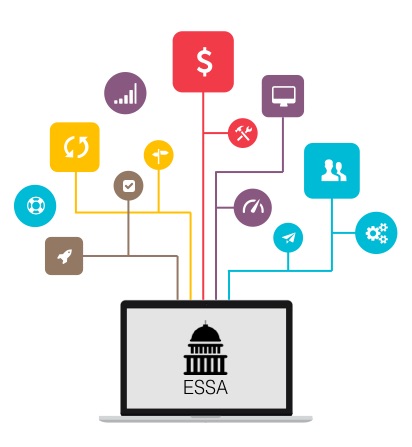With last year’s SOL test scores just released, it is important to consider how Virginia can revitalize holding divisions and schools accountable for student results under a new federal education law. This is a pivotal opportunity for the commonwealth to move away from No Child Left Behind and focus on student academic growth, personalized teaching and learning, and more comprehensive views of student success.
The new Every Student Succeeds Act gives states the opportunity and responsibility to create a more compelling and effective education system. The law goes into effect with the 2017-18 school year. Here’s how Virginia can use the next year sowing the seeds for success:
The Standards of Learning Innovation Committee can help modernize Virginia’s accountability and assessment system by focusing on more powerful measures of learning that better align with innovative instructional practices, like personalizing learning – the targeting of teaching to the different levels and pace at which individual students learn, so that students share responsibility for their learning.
 Further, the state Board of Education is reviewing the Standards of Quality and can address outdated, prescriptive requirements that inhibit more flexible, state-of-the-art approaches. For example, the dictates of SOQ 3 involving accreditation and assessment tightly lock up decision-making about student progress and success at the state board with narrow definitions of achievement on the SOLs.
Further, the state Board of Education is reviewing the Standards of Quality and can address outdated, prescriptive requirements that inhibit more flexible, state-of-the-art approaches. For example, the dictates of SOQ 3 involving accreditation and assessment tightly lock up decision-making about student progress and success at the state board with narrow definitions of achievement on the SOLs.
Since Virginia instituted its SOL-based accountability system 18 years ago, the tests have shown that holding schools accountable for students’ academic achievement can make an important difference in raising achievement levels. But the state’s accountability and testing practices have become snapshot, after-the-fact exercises in scorekeeping. While it may be useful to know where students have been in the past, it isn’t helpful to teachers in figuring out where they need to go right now.
Virginia can reframe accountability as a system of aligned supports, rather than punitive sanctions, to encourage continuous improvement rather than frustrated compliance. By incorporating indicators of student success that gauge, support and enhance personalized learning, the Old Dominion can take a bold step toward a more aligned, cohesive and compelling public education system.
Schools across the commonwealth, and across the country, are using personalized learning to tailor the educational experience to each student’s individual needs and interests, rather than teaching to the middle and hoping for the best. In a personalized approach, students can access digital resources to work at their own pace, moving on to the next stage of learning when they’re ready instead of following rigid grade levels.
A growing number of Virginia’s school divisions are utilizing technology in potent new ways to provide these more customized student learning experiences. A great example of this is underway in Loudoun County, the third largest school division in the state, where teachers are employing new software and using real-time information about individual student achievement to accelerate learning and encourage deeper levels of understanding.
In the Bedford County schools, an elementary school pilot program allowing students to work at their own pace using computers — while teachers employ different interventions — is producing not only higher test scores, but fewer behavioral issues.
The highly individualized approach of personalized learning can be unified with the broad application of state standards; the end goal is the same for all students, but the path to that goal can be different for each student.
The performance of Virginia’s students on the Standards of Learning, as well as the National Assessment of Educational Progress, is generally strong, but progress has slowed and broad gaps in student achievement persist.
Under the new federal law, Virginia can emphasize student achievement growth toward rigorous graduation requirements over simple grade level expectations in a wide range of subjects. Measuring student growth along individual learning trajectories, including mastering deeper levels of knowledge, is a more robust way of looking at student achievement and provides teachers more opportunities to help students succeed.
Finally, Virginia should consider integrating one or more indicators specific to personalized learning that are not related to academic assessment. In a personalized learning environment, success is defined by a comprehensive view of a student’s knowledge, skills, habits and mindsets.
To re-establish itself as a bastion of excellence as well as innovation, Virginia must rebuild accountability and rejuvenate assessment. It will take vision, creativity, expertise — including collaboration with local school divisions — and commitment to get Virginia’s system right.
Find Archived Articles:
